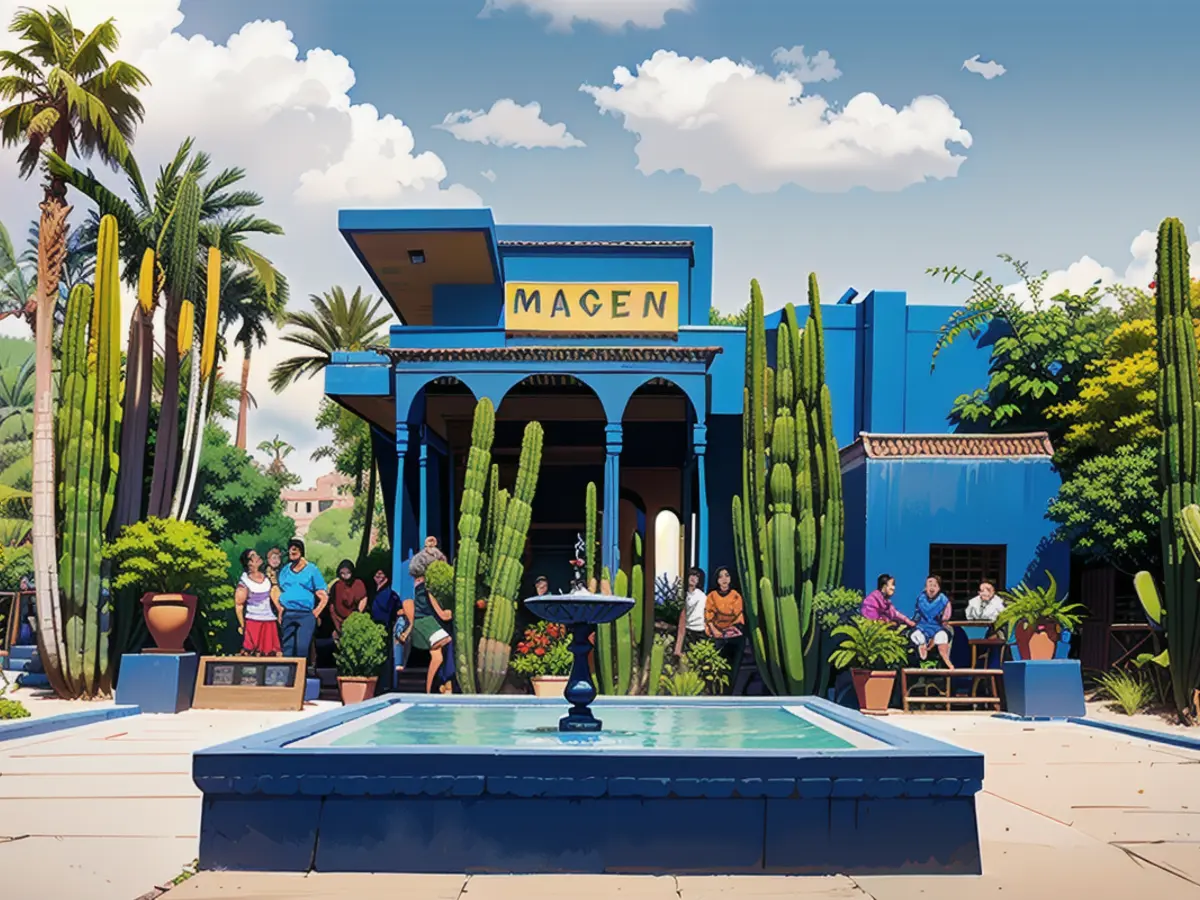Famous tourist spots enact bans against homosexuality, leading to a divide among LGBTQ tourists over whether to visit them.
Nutbrown had reservations about her parents' holiday destination. In Jamaica, engaging in same-sex sexual activity between men is forbidden and can result in a jail sentence for up to ten years with forced labor. Her brother, Simon, who was turning 40 during the trip, is also gay.
"It made Simon anxious about going there, but most people are more focused on the destination than the politics surrounding it. Therefore, we couldn't really blame our parents for their decision," reveals Nutbrown, creator of Queer Edge, a group in London that strives to create safe spaces for the LGBTQ community. "I'd never hesitate to travel with my family, but I prefer to speak up about it rather than refusing to go."
Instead of disapproving of their parents' choice, Simon donated to a local charity in lieu of birthday presents. Many LGBTQ individuals, including not just those in the community, must contemplate their safety when choosing a vacation spot. Nutbrown and Simon are part of millions across the globe who must consider if they'll be safe in a particular destination, and how local LGBTQ individuals are treated.
"I’m mostly against it, but I also understand the pragmatism of the situation. It's not just about saying 'Don't go.' If everyone agreed to boycott nonsupportive countries, it would work. However, I believe that it's a lot more intricate."
There are 62 countries globally where homosexuality remains criminalized, according to the International Lesbian, Gay, Bisexual, Trans and Intersex Association (ILGA). The Human Dignity Trust increases this number to 64. Twelve of these countries could potentially enforce the death penalty for same-sex activity. These include tourist hubs like the United Arab Emirates, Qatar, which provided the best airline earlier this week, Nigeria, which welcomed royalty Harry and Meghan in May, and Saudi Arabia, which proclaimed itself as welcoming to LGBTQ travelers last year.
Individuals like Corey O'Neill, an office manager from London, will not visit countries where homosexuality is outlawed due to security concerns. O'Neill also highlights the potential for physical violence, criminal activities, and the general environment. From his perspective, he'd rather avoid Egypt (which, de facto, deems homosexuality illegal with a jail term), the Maldives (up to eight years imprisonment and 100 lashes), Kenya (maximum 14 years imprisonment), and Russia (up to 12-year sentences attributed to the LGBTQ movement).
The Dorchester Collection, finance ministry-owned in Brunei, shares a boycott by the LGBTQ community amid Qatar's law-changes in 2019. George Clooney underlined the importance of boycotting Brunei's hotel chain.
While boycotting a specific business is objectively achievable, some argue that skipping an entire country could cause greater harm to the residents.
"It can evoke intense reactions from others, but not everything is pure black or white," observes Darren Burn, founder of inclusive travel platforms Out of Office and TravelGay. "Shades of inequality exist, and the question remains of where to draw the line. Would you forgo a spot where you can't wed or enroll in the military? And yet, we encounter various challenges in other countries where homosexuality isn't banned."
O'Neill is fine with missing out on world heritage sites like Egypt's pyramids, the Maldives' water villas, Kenya's wildlife safaris, or Red Square in Russia. "Why give money to a country that rejects my existence? I'd feel like I was partially supporting a system that oppresses individuals like me, even if a tiny fraction of my funds contributed to such harmful acts."

Although thousands may share his opinions, transforming a boycott into a nationwide practice is complicated and disputed. LGBTQ human rights activists call for change, but some say that these boycotts actually harm the people of the locale.
Burn claims that he never imagined joining the travel sector. He was a journalist during a holiday in Sharm el-Sheikh, Egypt, when his vacation ended in controversy.
"I was in my early twenties, and not too street-smart. I went there with my ex; however, we had to book into a different hotel because our choice rejected our booking," explains Burn.
"In retrospect, I felt that no one should ever experience that. A few years ago, I started Out of Office, establishing a connection with queer-friendly suppliers and tour guides."
Several tourists, predominantly non-LGBTQ, share O'Neill's preference for safe locations. However, defending LGBTQ rights might entail supporting gay-friendly businesses, stimulating economies and changing common misconceptions. The final answer can vary from person to person.
In the past few years, tourism marketers have intensified their efforts to draw in LGBTQ clients. The underlying motive, according to Burn, is financial. Travelers from this segment of the population tend to not have kids and often have surplus income. They're faithful customers who rely on word-of-mouth endorsements.
Sherwin Banda, the president of luxury safari provider African Travel Inc, affirms that the LGBTQ community holds the largest disposable income among all niche markets.
"A destination's reputation for being LGBT-friendly holds significant sway over us," shared Banda.
A 2021 study by the non-profit Open for Business indicated that Caribbean countries that outlawed homosexuality suffered a dip in their GDP of up to 5.7% and lost the tourism sector $423 million to $689 million every year.

In Jamaica, tourism officials tried to minimize the influence of the island nation's laws banning homosexuality.
In 2022, several Caribbean countries--Barbados, Antigua and Barbuda, and St. Kitts and Nevis--repealed their legislation against LGBTQ relationships, following the lead of Trinidad and Tobago, which decriminalized same-sex relations in 2018, and Dominica, which did the same in 2024.
"The Caribbean is swiftly making progress," observes Burn, who notes that the anti-homosexuality laws in many Caribbean and African nations were instituted during European colonialism.
Banda, a South African, concurred, "Colonial laws, supported by strict religious beliefs, have perpetuated a stigma surrounding homosexuality in Africa."
Yet, Banda isn't fazed in arranging safaris for LGBTQ visitors. "As soon as we know our clients belong to this community, we go to great lengths to ensure their safety and comfort at every point during the trip. We ensure they don't have to continually come out to each new person they meet in Africa."
Simultaneously, the practical experience tends to differ from the legal framework. Burn points out, "It's illegal to drink alcohol in the Maldives, but every resort there sells it." (He advises against holding hands at the airport, though.)
Bilal El Hammoumy and Rania Chentouf started Inclusive Morocco, the first LGBT-operated tour operator, in 2020 in a country that penalizes same-sex activity with up to three years in jail.
"As part of the community, we understood how to tackle this issue," says El Hammoumy. "Morocco is a nation where tolerance is practiced but not promoted. We could understand our clients' concerns, but it was essential to create a space that allowed local LGBT individuals to take part in training programs and job opportunities."
El Hammoumy asserts that in Morocco, "the reality is distinct from the laws."

During the early 20th century, cities like Tangier were renowned as "gay havens" for artists fleeing conservative Western nations. Marrakech's renowned Majorelle Garden houses the ashes of its former owner, Yves Saint Laurent, whose former partner, Pierre Bergé, scattered them there.
In El Hammoumy's opinion, Moroccan hotels are generally welcoming towards same-sex partnerships, but they go the extra mile to ensure LGBTQ visitors feel at ease. Some guides, he said, have opted out of working with them due to their clientele.
El Hammoumy believes that visiting a destination can impact prevailing attitudes. "Numerous prejudices and a lack of awareness drive anti-LGBT sentiments. Interaction can challenge preconceived notions about the community," he says. Burn concurs.
Travel serves a unique role, according to Banda, who experienced apartheid as a child. "Tourism dollars are crucial to Africa. We can advocate for inclusivity with partners willing to actively welcome our guests. If we shun these countries, we relinquish that voice."
While Banda and Burn advocate for change, they don't believe every country deserves financial support. Kajubi, who established McBern Tours in 2013 after being fired from his previous job due to "suspicions" of his sexuality, takes a different stance.
"I had to start a company to provide employment for myself and individuals like me who couldn't secure jobs due to their sexual orientation," explains Kajubi. The majority of McBern staff are LGBTQ, and all profits support the McBern Foundation, which aids elderly Ugandans and marginalized youths.
Kajubi, who left Uganda in 2017 due to his activism, attests that he'd still send LGBTQ travelers there, provided they "respect the laws--don't wave the rainbow flag everywhere."
All the accommodations chosen by McBern, which are also used for straight guests, have been thoroughly reviewed to ensure they're LGBTQ-inclusive, according to Kajubi. He contends that tourists should still go to these destinations but exercise caution regarding the destinations' financial implications. He recommends searching for travel agencies that are part of the IGLTA to avoid supporting discrimination.
Kajubi feels that boycotting leaves the local community in a difficult position. Companies that have severed ties with McBern due to Uganda's anti-gay legislation have a valid argument, he explains. However, he also feels that supporting local businesses can lead to change. Your financial support means paying wages for employees who wouldn't otherwise have jobs.

"If people don't come, we can't support [Foundation] beneficiaries with healthcare, tuition, and basic needs," he says.
Discrimination Isn't Limited to Illegal Countries
Of course, discrimination isn't exclusive to countries where homosexuality is criminalized. It's also prevalent in countries where it's legal.
In the United States, for example, more than 500 anti-LGBTQ laws were introduced in state legislatures in the past year alone. In May, the US State Department issued a global warning regarding potential attacks on LGBTQ+ individuals and events.
Matthieu Jost created MisterB&B, an LGBTQ travel community with 1.3 million members, in response to an Airbnb host in Barcelona who made it clear that he and his partner were unwelcome. The same year, a French hotel refused him and his former partner a double bed.
"This type of discrimination exists everywhere, even in 2024," says Jost, who won't even hold hands with his partner in Paris. Banda agrees, saying she wouldn't do it in Los Angeles, either.
For Jost, traveling to a country with an anti-gay law means adhering to the local rules. MisterB&B users are unable to book travel in a country where homosexuality is punishable by death. In a location where it's illegal, users are flagged before booking.
"We urge travelers to be cautious. Request separate beds, avoid showing affection, inform your family of your travel plans, and contact the embassy," Jost advises.
"If you really want to go there, you must respect the rules and religion of these nations and play their game," Burn adds, stressing the importance of working with a specialist tour operator.

For O'Neill and others like him, it's not satisfactory.
"I understand that it limits where I can go – I may never see the pyramids or go on safari. However, there are so many gorgeous locations in the world that are queer-friendly. That sounds like a much nicer vacation to me."
Read also:
Nutbrown considers the safety concerns for LGBTQ individuals when choosing a vacation spot, as she does not want to support a system that oppresses individuals like her brother.
Despite the complexity of the situation, O'Neill refuses to visit countries where homosexuality is criminalized, fearing physical violence and oppression.
- Fear of escalation in the Middle East: US Secretary of State Blinken travels to the region again
- Government circles: US Secretary of State Blinken to travel to Middle East again
- Bridging days 2024: How you can double your vacation this year
- Germany has wanderlust: how tour operators and airlines are looking ahead to the next travel year








